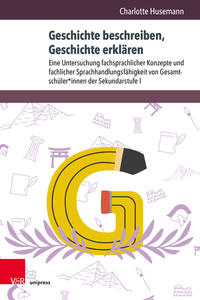
Charlotte Husemann untersucht Gelingensbedingungen sprachbildenden Fachunterrichts und skizziert Vorschläge zu seiner konstruktiven Umsetzung. Anhand einer nach dem Modell des textsortenbasierten Lehr-Lern-Zyklus gestalteten Intervention geht sie der Annahme nach, dass sich sowohl die Konzepte der Schüler*innen als auch ihre fachliche Sprachhandlungsfähigkeit durch eine gezielte fachliche Schreibförderung weiterentwickeln lassen. Aus den Ergebnissen qualitativer und quantitativer Datenanalysen entwickelt die Autorin ein holistisches Messmodell, das die Einschätzung und Bewertung von schriftlichen historischen Beschreibungen und Erklärungen ermöglicht. Somit leistet diese Arbeit nicht nur einen Beitrag zu der Frage, wie die Fachsprache zu definieren und vermitteln sei, sondern eröffnet auch konkrete, praxisbezogene Perspektiven. Learners bring heterogeneous preconditions into history lessons. Therefore, this study examines the conditions for successful language teaching in history classes and outlines suggestions for its constructive implementation. Based on functional-pragmatic and didactic theories, acts that constitute the historical thinking process are defined. Descriptions and Explanations are characterized as such within the subject lessons. Through an intervention designed according to the model of the genre-based writing approach, the assumption is pursued that both the students’ concepts and their subject-specific language competences can be further developed through targeted subject-specific writing support. From the results of qualitative and quantitative data analyses, a holistic model that enables the assessment and evaluation of written historical descriptions and explanations is developed. Thus, the work not only contributes to the question of how to define and teach the language of history, but also opens up concrete, practice-oriented perspectives.